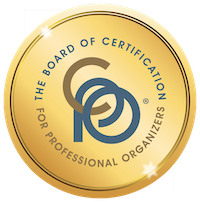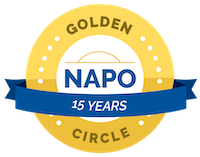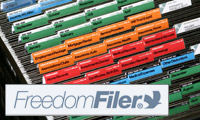It's easier to keep up than to catch up

I’ve gotten behind in my data entry for Quickbooks, my financial software. I hate it when that happens. I put the blame on my puppy, Bix, who turned everything upside down when he joined our family in December. I let the receipts pile up and soon they were overwhelming. (Okay, I know it’s not fair to blame my adorable puppy for my shortcomings.)
Finally, this Memorial Day weekend, I’m getting caught up. It’s not exactly how I wanted to spend the holiday weekend, but I’m really glad to get it done.
(Oh, and I’m sure you’re wondering why I don’t automate the data entry. I don’t have a good reason beyond that I like how I do things. Manual data entry makes me feel really in touch with my finances and, unless I let myself get behind, it works really well for me.)
The weird thing is, I don’t mind doing bookkeeping. I even like it a little. (And I have no interest in hiring a bookkeeper.) But slogging through everything when there’s a five-month backlog becomes drudgery. It got me thinking about how much easier it is to bookkeeping on a daily, weekly, or even monthly basis. Here’s why:
- The information is fresh, so entering it is a no brainer. (Four-month-old deposits can sometimes be head scratchers, despite my best efforts to notate everything.)
- The pile of receipts and other information to work on is unintimidatingly small.
- When I’m caught up on my bookkeeping I can run reports and really know where I stand.
The benefit of making frequent, small efforts isn’t limited to finances, of course. Doing routine tasks regularly, instead of letting them build up, helps with filing, decluttering, cleaning, and many, many other tasks. For example, I wipe my bathroom fixtures with a Lysol wipe daily so my bathroom doesn’t get gross soap buildup.
I’m going to finish catching up with my bookkeeping and once I’m current, I’m going to try hard not to get behind on my Quickbooks again. I can’t wait to start generating some reports!
Lessons learned from a painful thumb
I was diagnosed with trigger finger recently (trigger thumb, actually). Trigger finger happens when the tendon in a finger or thumb becomes inflamed, causing the finger to catch in its sheath. The finger then locks in the bent position and then releases with a snap.
As soon as I noticed severe pain in my thumb and experienced that tell-tale snap after waking up, along with a constant dull pain in the thumb, I made an appointment with a hand doctor. (My husband has had surgery for trigger finger twice, so I was clued in.) The doctor confirmed my self-diagnosis and suggested a steroid shot. I’d heard that the steroid shot was really painful, but I decided to give it a try.
What does this have to do with organizing? It brought to mind two things that I see in clients while decluttering and organizing.
First, the fear of the pain of the shot was worse than the pain itself. And while it was quite painful for about 10 to 12 (long) seconds, it wasn’t by any means unbearable. Once the pain of the shot was gone, the pain of the condition slowly started to fade away.
It got me thinking about the fear some clients feel about hiring an organizer or the prospect of going through the decision-making process of decluttering. It seems scary, but the pain is over pretty quickly. And once you’re past the pain of getting started, you can start getting relief.
After I got my steroid shot I was (unrealistically) expecting instant relief. That wasn’t the case. It took probably a week, but every day there was less pain in my thumb. Then one day there was no pain at all. I could grip items without pain and the constant dull ache was gone. And mornings were much easier, since I woke up pain free.
It probably took me a week to notice the absence of pain. That was a real a-ha moment for me. Once I noticed that my thumb no longer hurt, I was delighted. The shot had worked! I was amazed that it took so long to notice.
Isn’t that true of a lot of things in life, including organizing systems? We notice what isn’t working. We feel the pain and frustration of failing systems or the absence of systems. But when things are going well, we often don’t even notice. We’re missing an opportunity to feel good about ourselves!
I encourage you to think about the things in your life that are working well. Notice the absence of frustration. Think about what you’re doing right and apply those lessons to the frustrating aspects of your life.
Noticing the absence of pain can be difficult. But it can be rewarding!
Worth repeating: Making travel mornings smoother
Tomorrow morning I fly to Atlanta for the annual meeting of the National Association of Professional Organizers. (Woo hoo!) So it seemed like an appropriate time to repeat this post, written a couple of years ago, about using a checklist to make packing easier. I still use that checklist each time I travel and it’s worked out well for me.
This morning, I had a flight that departed at 5:50, which meant I needed to leave for the airport at 4:15. That meant I needed to get up at 3:15. In the morning. Actually, I probably should have either (a) arised earlier or (b) packed absolutely everything but morning essentials the night before.
I was rushed getting ready. And I was a bit groggy. As a result, I forgot to pack a few things. Nothing critical, but I’m still kicking myself. (I forgot my backup battery charger for my iPhone or iPad, my car charger for my phone—which I may not need if my rental car has a USB port—and toothpaste and mascara.)
The thing is, I’m not a haphazard packer. But I find it’s the stuff I pack on travel day that can problematic.
I had a little time at the gate, and as I sat there thinking about the things I’d forgotten to pack, I created a checklist of items to consult on future trips. I put an asterisk next to the ones I forgot this time, hoping to reinforce remembering them in the future.
Since I tend to take morning flights, I think I’ll take it a step further and create a list of things to pack the night before and things to pack in the morning. Obviously, the more I pack the night before, the better. My practice has been to pack electronics in the morning.
Another helpful thing I could do would be to have travel versions of most of my toiletries, which reside in my travel toiletries kit. Then I wouldn’t have to worry about packing those items. I already do that for a lot of things, like shampoo and conditioner, but I’d run out of travel-sized toothpaste.
I dislike being rushed or frazzled (I literally was repeating that Phil Dunphy maxim, Slow is smooth and smooth is fast, as I was getting ready this morning.) I think these checklists will make my next trip easier.
How will you be remembered?

Rick Simoncelli
My husband and I attended a friend’s memorial service on Saturday. Rick Simoncelli was a warm, wonderful, accomplished man, who will be greatly missed not only by his family and friends, but by the St. Louis community. His memorial service was a beautiful celebration of a life well-lived, though Rick was only 65 when he passed away from brain cancer. 250 or so people crowded the church to pay their respects in a touching and joyous celebration of life.
Listening to the kind words spoken about Rick and learning about aspects of his life I hadn’t known about, I started thinking about my own memorial service. What do I hope will be said about me?
Two things jumped to my mind: I would like to be remembered for how my life affected others (in a positive way, of course). And I would like to be remembered as a kind person.
Do I want to be remembered as a successful business person or author? Sure. But it’s more important to me to be remembered as someone who brought joy to others and really helped them.
The good news is that this is within my control. I can live life as I want to be remembered. It’s so easy to get caught up in day-to-day activities, focusing on the minutiae rather than the big picture. As death tends to do, Rick’s passing brought home the realization of how short our lives our and how important it is to make the most of every day.
In the coming weeks, will take the opportunity to ponder my legacy and renew my efforts to live the life worthy of remembering. And I will miss Rick and try to be a good friend to his wife, Claudia, and daughters, Jessica and Amelia, who will miss him even more than me.
How would you like to be remembered?
The importance of a place for everything

My husband and I are in the midst of a kitchen renovation. If you’ve ever done that, you know how disruptive it can be. We’re lucky in that we actually have a spare kitchen to use. (We live in a two-family house, but no longer rent out the downstairs apartment.) Still, despite my best efforts to organize the downstairs kitchen for our temporary use, everything feels topsy turvy.
This has led to two realizations on my part:
- The kitchen really is the heart of the home. Take it away and you feel adrift.
- When you don’t have a place for everything, you really can’t maintain order.
I’m a naturally messy person, as I’ve written here many times. I don’t mind a little disorder around me. But I’ve come to learn that the critical component to maintaining my sanity amidst disorder is that I know where everything goes and know I can put it away swiftly.
Right now, we have items that usually belong in the upstairs kitchen (our main kitchen) and need to reside on the second floor that I just can’t find a home for. So the dining room table and a desk remain cluttered, despite my efforts. We’re slowly getting into a groove (we’ve been out of our kitchen a week). Just getting out the door has been challenging because we’re accustomed to exiting from the back staircase off the upstairs kitchen and that’s where items like our keys, my purse and dog-walking paraphernalia used to reside. For a little while, until we established a new place for them, we’d walk all over the house looking for those items.
The whole experience has given me new-found empathy for my clients who struggle because they don’t have a place for everything and therefore can’t find anything. And it’s made me understand the relief they feel when we help them establish a place for everything so they can put things away.
So far, the renovation is on schedule and (knock wood) we’ll be back in our kitchen by the end of the month. I cannot wait to unpack our kitchen stuff into the new space. (I created a spreadsheet detailing where everything’s going to go.) I’ll probably enlist the help of one or more professional organizers to help me organize my kitchen when that happy day comes.
Here’s the bottom line. The adage, “A place for everything and everything in its place” is truly the key to a peaceful life for me. If you’re not living it, I encourage you to do what you can to get there! (Here’s a hint: the first step is usually decluttering!)
POMO in the news
I was delighted to be included in articles on blogs published by a couple of prominent magazines recently!
I provided one of the tips for the article 9 Surprisingly Simple Ways to Get People to Respond to Your Email on FastCompany.com, affiliated with the business magazine. My tip is indeed simple, but effective: Write “Response Needed” in the subject line of the email. That blog post appeared on March 30.
Less than a week later, I was included in an article on GoodHousekeeping.com called 11 Secrets from the World’s Tidiest People. Now, if you have read this blog for any length of time you know that I am by no means one of the world’s tidiest people. In fact, I’m naturally messy. I gave full disclosure to the writer but answered her questions anyway. And she liked what I had to say. This just goes to show you that you can learn to be organized!
These articles are both great reads and I encourage you to check them out!
Deal with the low-hanging fruit first

My Inbox Zero policy has taken a beating in 2016. I blame my puppy, Bix, for allowing me to get behind on it. (I blame Bix for a lot of things…it’s very handy.) But whatever the reason, I’ve had a really challenging time keeping my inbox in check this year.
I really love the habit of emptying my inbox daily. It has so many benefits. But it is one of those habits that’s a little harder to reinstitute after a backlog develops. I have no interesting in declaring email bankruptcy. i just want to get it down to zero and get back to a daily habit of keeping it down every day, if not to zero then to no more than ten.
I was working on it this morning. When I sat down at my computer I had something like 70 messages in my inbox. I set a goal of getting it down to 20. I surpassed that goal—I’m at 6 right now. I would really like to get it down to zero by the time I go to bed tonight.
So how did I go from 70 to 6 in the course of an hour or so this morning? I started with the low-hanging fruit. This is the order in which I took things:
- I deleted junk emails that came in overnight. (I get an astounding number of Italian-language spams. Talk about low-hanging fruit.)
- I moved emails that required no action but that I wanted to archive.
- I skimmed a few newsletters that I had let languish in my inbox—that took almost no time and revealed a few nuggets I was glad to know about. Then I deleted the newsletters.
- I forwarded to Evernote emails that I wanted easy access to or reminders about.
- I took action on a few emails, like deciding to register for a conference and then actually registering and making a hotel reservation.
That left me with six emails, all of which require some sort of consideration and reply. I am confident that given less than half an hour of focused time, I can take action and archive them before I go to bed tonight (and, of course, deal with everything else that comes in in the interim).
With email, as with clutter or so many other things, dealing with the easy items first can have a large impact. And once you’ve distilled the backlog, it becomes much easier to focus on the important items and take action.
I’m traveling now, but I have high hopes that I’ll get to zero in my inbox today and maintain it until I get home. (I am fortunate in that my schedule allows me some focused times in the morning on this trip.)
Taking just a few minutes a day to take care of the emails I consider the low-hanging fruit (or better yet, delete them the moment I see them), will help make this process easier.
ETA: It’s 10:30 p.m. on April 18 and I was able to get my inbox down to zero. It feels so good!!
Photo by Ian Carroll via Flickr. Used under Creative Commons License
Links
- Shannon Wilkinson, life coach
- Organize Your Family History
- Peace of Mind Spending
- Institute for Challenging Disorganization
- Getting to Good Enough podcast
- National Association of Productivity and Organizing Professionals
- NAPO St. Louis
- Are you interested in becoming a professional organizer?
- Ravelry








